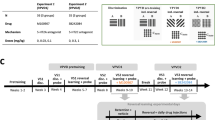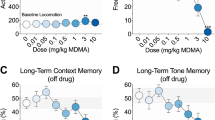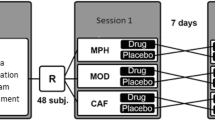Abstract
Acquisition and retention of tolerance to ethanol's rate-decreasing effects on operant performance were examined in rats which received a 52-day regimen of ethanol or saline injections prior to and/or after each daily session. Eight groups of rats differed on: (a) number of days with intoxicated practice (pre-session ethanol); (b) intermittent (spaced) or daily (massed) intoxicated practice; and (c) post-session ethanol or saline on nonintoxicated practice days. Massed practice groups were given their presession saline days prior to their pre-session ethanol days. Ethanol dose-effect tests were given prior to, during, and after the chronic injection regimen. Under both spaced and massed practice conditions, the magnitude of tolerance developed increased directly with the number of pre-session ethanol days, even when absolute ethanol exposure was constant. No group showed complete tolerance loss. The post-session ethanol supplements (a) facilitated tolerance development in spaced practice groups and tolerance loss in massed practice groups, (b) blocked ethanol's low dose rate-increasing effects, and (c) produced an acute withdrawal-like performance disruption the next day. The results suggest that both intoxicated practice and practice during acute ethanol withdrawal influence the acquisition and retention of compensatory behaviors during ethanol tolerance development.
Similar content being viewed by others
References
Bird DC, Holloway FA, Carney JM (1985) Schedule-controlled behavior as an index of the development and loss of ethanol tolerance in the rat. Psychopharmacology 87:414–420
Bitrán M, Kalant H (1991) Learning factor in rapid tolerance to ethanol-induced motor impairment. Pharmacol Biochem Behav 39:917–922
Chen CS (1968) A study of the alcohol tolerance effect and an introduction of a new behavioral technique. Psychopharmacologia 12:433–440
Chen CS (1972) A further note on studies of acquired behavioral tolerance to alcohol. Psychopharmacologia 27:265–274
Chen CS (1979) Acquisition of behavioral tolerance as a function of reinforced practice. Psychopharmacology 63:285–288
Dickinson A (1980) Contemporary animal learning theory. Cambridge University Press, New York, pp 15–16
Gauvin DV, Holloway FA (1992) Ethanol tolerance developed during intoxicated operant performance in rats prevents subsequent ethanol-induced conditioned taste aversion. Alcohol 9:1–7
Gauvin DV, Harland RD, Criado JR, Michaelis RC, Holloway FA (1989) The discriminative stimulus properties of ethanol and acute ethanol withdrawal states in rats. Drug Alcohol Depend 24:103–114
Gauvin DV, Youngblood BD, Holloway FA (1992) Discriminative stimulus properties of ethanol “hangover” in rats. Alcohol Clin Exp Res 16:109–116
Goudie AJ, Demellweek C (1986) Conditioning factors in drug tolerance. In Goldberg SR, Stolerman IP (eds) Behavioral analysis of the drug dependence. Academic Press, New York, pp. 225–286
Holloway FA, Gauvin DV (1991) Similarities between “hangover” and chronic ethanol withdrawal in rats. Alcohol Clin Exp Res 15:332
Holloway FA, King DA (1989) Parallel development of ethanol tolerance and operant compensatory behaviors in rats. Pharmacol Biochem Behav 34:855–961
Holloway FA, Bird DC, Holloway JA, Michaelis RC (1988) Behavioral factors in the development of tolerance to ethanol's effects. Pharmacol Biochem Behav 29:105–113
Holloway FA, King DA, Michaelis RC, Harland RD, Bird DC (1989) Tolerance to ethanol's disruptive effects on operant behavior in rats. Psychopharmacology 99:479–485
Holloway FA, King DA, Bedingfield JB, Gauvin DV (1992) Role of context in ethanol tolerance and subsequent hedonic effects. Alcohol 9:109–116
Hovland CI (1960) Human learning and retention. In: Stevens SS (ed) Handbook of experimental psychology. Wiley, New York, pp 636–642
Lal H, Harris, CM, Benjamin D, Springfield AC, Bhadra S, Emmett-Oglesby MW (1988) Characterization of a pentylenetetrazol-like interoceptive stimulus produced by ethanol withdrawal. J Pharmacol Exp Ther 247:508–518
Lê, AD, Kalant H, Khanna JM (1989) Role of intoxicated practice in the development of ethanol tolerance. Psychopharmacology 99:366–370
McQuarrie DG, Fingl E (1958) Effects of single doses and chronic administration of ethanol on experimental seizures in mice. J Pharmacol Exp Ther 124:264–271
Melchior CL, Tabakoff B (1985) Features of environment-dependent tolerance to ethanol. Psychopharmacology 87:94–100
Osgood CE (1953) Method and theory in experimental psychology. Oxford University Press, New York, pp 504–509
Pohorecky LA (1974) Effects of ethanol on central and peripheral noradrenergic neurons. J Pharmacol Exp Ther 189:380–391
Pohorecky LA, Brick J (1982) A new method for the determination of blood ethanol levels in rodents. Pharmacol Biochem Behav 16:693–696
Pohorecky LA, Roberts P (1991) Development of tolerance to and physical dependence on ethanol: daily versus repeated cycles treatment with ethanol. Alcohol Clin Exp Res 15:824–833
Redmond GP, Cohen G (1972) Sex difference in acetaldehyde exhalation following ethanol administration in C57/BL mice. Nature 236:117–119
Schuster CR (1978) Theoretical basis of behavioral tolerance: implications of phenomena for drug abuse. In: Krasnegor NA (ed) NIDA research monograph no 18, behavioral tolerance: research and treatment implications. U.S. Government Printing Office, Washington, DC, pp 10–12
Schuster CR, Dockins W, Woods J (1966) Behavioral variables affecting the development of amphetamine tolerance. Psychopharmacologia 9:170–182
Tabakoff B, Hoffman PL (1988) Tolerance and the etiology of alcoholism: hypothesis and mechanism. Alcohol Clin Exp Res 12:184–186
Torres A, Michaelis RC, Holloway KJ, Holloway FA (1986) A method for determining ethanol and acetaldehyde components from expired air samples in rats. Neurosci Abstr 12:286
Vogel-Sprott M, Sdao-Jarvie K (1989) Learned alcohol tolerance: the contribution of response expectancies. Psychopharmacology 99:479–485
Wenger GR (1980) Cumulative dose-response curves in behavioral pharmacology. Pharmacol Biochem Behav 13:647–651
Wenger JR, Berlin V, Woods, SC (1980) Learned tolerance to the behaviorally disruptive effects of ethanol. Behav Neural Biol 28:418–430
Wenger JR, Tiffany TM, Bombardier C, Nicholls K, Woods SC (1981) Ethanol tolerance in the rat is learned. Science 213:575–577
Author information
Authors and Affiliations
Rights and permissions
About this article
Cite this article
Holloway, F.A., Michaelis, R.C., Harland, R.D. et al. Tolerance to ethanol's effects on operant performance in rats: role of number and pattern of intoxicated practice opportunities. Psychopharmacology 109, 112–120 (1992). https://doi.org/10.1007/BF02245488
Received:
Revised:
Issue Date:
DOI: https://doi.org/10.1007/BF02245488




